Venezuela

On February 11, 2019, Ariel Dorfman published an article in the Nation, in which he imagined the advice of the late Chilean president Salvador Allende would supposedly offer Nicolás Maduro in order to confront successfully the challenges of the current Venezuelan conjuncture. This is Allende’s fictional reply to Dorfman. | more…
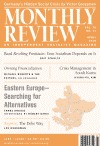
In the midst of the U.S.-directed coup attempt against the Bolivarian Republic of Venezuela in January–February, Donald Trump delivered a number of verbal attacks on socialism in Venezuela, Cuba, and Nicaragua. The immediate object was to justify U.S. attempts to overthrow the Bolivarian Republic. The less immediate, but hardly less important, goal was to tarnish the growing social democratic (self-styled democratic socialist) movement in the United States, associated with figures like Bernie Sanders and Alexandria Ocasio-Cortez. In order to safeguard their ambitious social-reform program, the new coterie of Democratic Party socialists have thus sought to separate themselves from Venezuela and other Latin American socialist states, presumably abandoning these countries to their fates at the hands of U.S. imperialism. This raises the historic question of social imperialism—a policy of social reform at home and imperial hegemony abroad. | more…
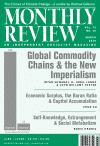
The present ongoing coup attempt organized in Washington is simply the latest in a series of such attempts by the U.S. government to overthrow the Bolivarian Republic of Venezuela over the last two decades. It can be seen as having three interrelated motives: (1) the destruction of Venezuelan socialism, (2) regaining control of Venezuela’s oil (the largest petroleum reserves in the world), and (3) reasserting U.S. hegemony over Latin America. | more…

Few countries and political processes have been subject to such scrutiny, yet so generally misunderstood, as Venezuela and the Bolivarian Revolution. This is particularly true today, as the international media paints an image of absolute devastation in the country, wrought by failed policies and government mismanagement. One way to comprehend the complexities of what is happening in Venezuela today—missed entirely by the dominant, mainstream narrative—is by homing in on the dynamics around Venezuela’s most highly consumed staple foods. | more…

President Chávez, in line with Marx, identified revolutionary praxis as the key link between human development and practice: “We have to practice socialism…and this practice will create us, ourselves, it will change us; if not we won’t make it.” From this standpoint, the material product of activity is always accompanied by a second product—the human product. Since the human product has historically been neglected in socialist theories of transition, it is worth considering its significance. | more…
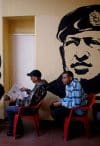
The Bolivarian Revolution in Venezuela has always been shaped by the dangers and demands of achieving socialism through democratic means. Only by reckoning with that complexity can we understand both Venezuela’s current crisis and its recent history. | more…

Benjamin’s philosophy presents problems best addressed not academically, but in dialogue with living political processes. And it is in Latin America, particularly Venezuela, that Benjamin’s ideas have been most vividly illustrated and interrogated. | more…

Marta Harnecker interviewed by Tassos Tsakiroglou
[wcm_nonmember]
This article will be made available online on April 24th.
[/wcm_nonmember] Although today there are some setbacks in the region, nobody can deny that there is a huge difference between the Latin America that Hugo Chávez inherited and the Latin America he left us. A new revolutionary subject has been created. | more…
Often the best way to begin to understand something is to consider what it is not. Socialism for the twenty-first century is not a society in which people sell their ability to work and are directed from above by others whose goal is profits rather than the satisfaction of human needs. It is not a society where the owners of the means of production benefit by dividing workers and communities in order to drive down wages and intensify work…. Nor is it a statist society where decisions are top-down and where all initiative is the property of state office-holders or cadres of self-reproducing vanguards.… Also, socialism for the twenty-first century is not populism.… Further, socialism for the twenty-first century is not totalitarianism.… [S]ocialism for the twenty-first century does not dictate personal belief…. Nor does socialism for the twenty-first century worship technology and productive forces…. Finally, contrary to its self-proclaimed inventor (Heinz Dieterich), socialism for the twenty-first century is not “essentially a problem of informatic complexity” that requires cybernetic calculation of quantities of concrete labor as the basis for an exchange of equivalents.&hellp; So, let us explain what socialism for the twenty-first century is. | more…
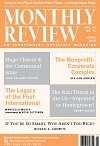
The Review of the Month in this issue (“Chávez and the Communal State” by John Bellamy Foster) focuses on the revolutionary political strategy introduced by Hugo Chávez and the Bolivarian movement in Venezuela. In the process it addresses how István Mészáros’s Beyond Capital played a key, strategic role in the development of Chávez’s thinking. Beyond Capital is a daunting philosophical work of around a thousand pages, while many of his other writings are nearly as challenging. MR readers will therefore be pleased to learn that we have just published a new book by Mészáros, The Necessity of Social Control (Monthly Review Press, 2015), expressly designed, as Foster writes in the book’s “Foreword,” as “an easily accessible work,” providing “a way into his thinking for the uninitiated” (9).… Yet, Mészáros’s new book is much more than that. | more…
On the Transition to Socialism in Venezuela
On October 20, 2012, less than two weeks after being reelected to his fourth term as Venezuelan president and only months before his death, Hugo Chávez delivered his crucial El Golpe de Timón (“Strike at the Helm”) speech to the first meeting of his ministers in the new revolutionary cycle. Chávez surprised even some of his strongest supporters by his insistence on the need for changes at the top in order to promote an immediate leap forward in the creation of what is referred to as “the communal state.” This was to accelerate the shift of power to the population that had begun with the formation of the communal councils (groupings of families involved in self-governance projects—in densely populated urban areas, 200–400 families; in rural areas, 50–100 families). The main aim in the new revolutionary cycle, he insisted, was to speed up the registration of communes, the key structure of the communal state. | more…
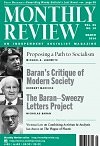
This issue of Monthly Review is mainly devoted to two commemorations: for Paul Alexander Baran, who died fifty years ago this month; and for Hugo Rafael Chávez Friás, who died one year ago this month.… Paul A. Baran was the author of The Political Economy of Growth (1957) and, with Paul M. Sweezy, Monopoly Capital (1966). Baran’s work on the roots of underdevelopment focused on the way in which the imperialist world system robbed countries of their actual and potential economic surplus, chaining them to conditions of dependency.… Hugo Chávez, president of Venezuela from 1999 until his death in March 2013, provided the crucial inspiration for the Bolivarian Revolution in Venezuela. Chávez created a new vernacular of revolution linked historically to Latin America’s Bolivarian tradition (marked by Bolívar’s famous statement that “equality is the law of laws”). | more…









